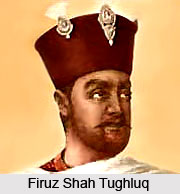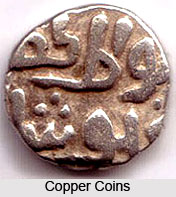 During the reign of Khusraw the Hindu officers in all the key positions of the state replaced Muslim officers. These Hindu officers openly dishonored mosques, started insulting Islam. The Muslims of South Asia could not tolerate the situation. They gathered around Gazi Malik, a Tughluq noble and pursued him to attack Khusraw. Khusraw was defeated in the war. Initially Ghazi Malik was not intending to ascend the throne of Delhi Sultanate. But there was nobody found as the successor of Khiliji Dynasty. In that juncture nobles invited him to become the Sultan. Thus he became the Sultan in 1320 and the founder of Tughluq dynasty. He took the title of Ghiyas-ud-din Tughluq Shah. The Tughluqs were originally a Muslim family of Turk.
During the reign of Khusraw the Hindu officers in all the key positions of the state replaced Muslim officers. These Hindu officers openly dishonored mosques, started insulting Islam. The Muslims of South Asia could not tolerate the situation. They gathered around Gazi Malik, a Tughluq noble and pursued him to attack Khusraw. Khusraw was defeated in the war. Initially Ghazi Malik was not intending to ascend the throne of Delhi Sultanate. But there was nobody found as the successor of Khiliji Dynasty. In that juncture nobles invited him to become the Sultan. Thus he became the Sultan in 1320 and the founder of Tughluq dynasty. He took the title of Ghiyas-ud-din Tughluq Shah. The Tughluqs were originally a Muslim family of Turk.
He conquered Bengal. After coming back to Delhi, his son Jauna Khan killed him cleverly in the name of giving guard of honor. Ghiyas-ud-din Tughluq shah has been the founder of the city called Tughluqabad near Delhi.
The Tughluq Empire grew in the true means under Muhammad Bin Tughluq. He was the son of Tughluq Shah. As he was a man of ideas, he therefore tried to implement a number of schemes. But all most all the schemes have failed. Experimentation of such ill-advised policies like shifting the Capital from Delhi to Daulatabad, introducing copper coins without proper protection against forgery made him unpopular amongst the masses.
 After Muhammad Bin Tughluq, Firuz Shah Tughluq ascended the throne. In the 37 years long ruling period Firuz Shah complemented himself with his remarkable administrative reforms. The task was not easy for him after widespread unrest by Muhammad Bin Tughluq. Firuz shah is remembered as the only one Sultan to think of material welfare of his people. He was also interested in social welfare. 40 mosque, 30 buildings as educational institutes, 100 hospitals, 100 public baths, 10 monumental pillars, 10 public wells and 150 bridges were constructed during his reign. Jaunpur, Firuzabad, Firuza were the cities built during his time. For agriculture, he sponsored to dig canals from Jamna and Sutlej rivers. He withdraws 22 taxes as they were against the spirit of Islam. But he forced Hindus to pay the `Jizya` tax. During his tenure if any Hindu found violating the rule or built temples, they were punished either with imprisonment or death. The "Tarikh-I-Firuz" is a historical record of his time. Women`s were not allowed to visit the holy tombs during his time. During his tenure Deccan became independent from the Delhi Sultanate.
After Muhammad Bin Tughluq, Firuz Shah Tughluq ascended the throne. In the 37 years long ruling period Firuz Shah complemented himself with his remarkable administrative reforms. The task was not easy for him after widespread unrest by Muhammad Bin Tughluq. Firuz shah is remembered as the only one Sultan to think of material welfare of his people. He was also interested in social welfare. 40 mosque, 30 buildings as educational institutes, 100 hospitals, 100 public baths, 10 monumental pillars, 10 public wells and 150 bridges were constructed during his reign. Jaunpur, Firuzabad, Firuza were the cities built during his time. For agriculture, he sponsored to dig canals from Jamna and Sutlej rivers. He withdraws 22 taxes as they were against the spirit of Islam. But he forced Hindus to pay the `Jizya` tax. During his tenure if any Hindu found violating the rule or built temples, they were punished either with imprisonment or death. The "Tarikh-I-Firuz" is a historical record of his time. Women`s were not allowed to visit the holy tombs during his time. During his tenure Deccan became independent from the Delhi Sultanate.
During his lifetime Firuz Shah handed over the power to his son Muhammad Shah. But he proved to be incompetent and was replaced by Ghiyas-ud-din Tughluq II. He failed to control the tussle within the house between the power hungry princes. This had been continued for about quarter of a century. In addition to that Amir Timur`s invasion on Delhi in 1398 totally destroyed the economic and political standings. Thus the Tughluq dynasty came to an end.






































